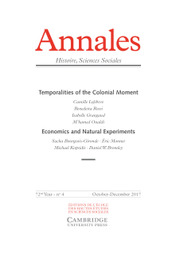Francesco Benigno
Never the Same Again: On Some Recent Interpretations of the French Revolution
This essay is a discussion of three recent and important books on the French Revolution: Timothy Tackett's The Coming of the Terror in the French Revolution, Jonathan Israel's Revolutionary Ideas: An Intellectual History of the French Revolution from the Rights of Man to Robespierre, and Haim Burstin's Révolutionnaires. Pour une anthropologie politique de la Révolution française. All three volumes are characterized by a welcome return to general interpretations based on new theoretical approaches and consider the revolutionary process from multiple points of view: the first uses the historiographical current known as the “new history of emotions” to explain the contemporary obsession with conspiracies and thence the Terror; the second proposes a new approach based on the traditional history of ideas, considered capable of explaining the so-called “hard facts”; the third envisages the revolutionary experience from an anthropological perspective, constructing a typology in order to characterize it. Nevertheless, all three are united by a reluctance to analyze the political structure itself; in other words, to investigate the concrete workings of political institutions during the Revolution.
Francisco Javier Ramón Solans
Being Immortal in Paris: Violence and Prophecy during the French Revolution
This article uses the case of Catherine Théot and her prophetic activity in late eighteenth-century Paris to reflect on the relationship between event and prophecy in the era of the French Revolution. Despite appearing fixed and immobile, Théot's prophecies were constantly changing and evolving, giving rise to hybrid discourses influenced by various currents including both Jansenism and revolutionary discourses. The Théot affair thus provides an occasion to reflect on contemporary supernatural interpretations of the French Revolution. In this context, her prophecies can be read as a response to the emotional needs triggered by political instability, the fear of war and political violence, and religious changes. In conclusion, the article points to a religious discourse that existed on the margins of the dialectic between revolution and counterrevolution, but was nevertheless closely linked to it though the effects of the Revolutionary Wars and the Terror.
Danny Trom
Elias on Anti-Semitism: Zionism or Sociology
This paper proposes to revisit the intellectual trajectory of Norbert Elias on the basis of an article published by the sociologist in a local Jewish newspaper in 1929 and entitled “On the Sociology of German Anti-Semitism.” It argues that in this seemingly circumstantial text, Elias asserts his decision to favor sociology, which had come to replace and envelop his engagement in the Zionist youth movement Blau-Weiss. This is evident in the article's somewhat ambiguous final sentence, where Elias presents German Jews with an alternative: collective emigration to Palestine or a lucid vision drawn from a sociological diagnosis of the situation. The paper begins by situating Elias's text within the range of analyses of anti-Semitism in 1920s Germany, comparing its approach to Zionism with that of Franz Oppenheimer. It then contextualizes its relationship to the sociology of Karl Mannheim: Elias was Mannheim's assistant in Frankfurt and his approach contrasted with the perspective developed in the same time and place by the Frankfurt school. Finally, the paper shows that Elias's sociological distantiation would imperceptibly take the place of the political distantiation that had centered on Zionism—a scientific movement that implied erasing from his memory the political Zionism he had long supported. A new French translation of Elias's 1929 text, also by Danny Trom, is included as an appendix.
Nicolas Dodier and Janine Barbot
The Force of Dispositifs
The social sciences have much to gain by paying particular attention to the place that dispositifs occupy in social life. The utility of such a perspective is clear from an examination of the research that has made use of this notion since the end of the 1970s. Yet in addition to the wide variety of definitions and objectives relating to the concept of dispositif, a reading of these works also reveals some of the difficulties that have been encountered along the way. An effort to clarify and renew the discussion on both the conceptual and methodological levels is thus worthwhile, and this article is a contribution to that end. The first section sets out the results of our conceptual inquiry into the notion of dispositif. The second puts forward a series of propositions designed to develop a “processual” approach to dispositifs. Finally, we return to several studies that we have conducted from this perspective relating to the dispositifs of redress, looking at the doctrinal work of jurists around a criminal trial, the practices of lawyers in the courtroom, the reactions of victims of a medical scandal to a compensation fund, and the historical transformation of dispositifs of redress for medical accidents since the beginning of the nineteenth century. This enables us to clarify the approach we propose and to suggest new avenues for the future.
Roger Chartier
Science and Knowledge
This review article poses three questions, essentially based on the first two volumes of Histoire des sciences et des savoirs, a collective undertaking edited by Dominique Pestre. First, it considers the relationships between “science” and “knowledge.” Can a clear line be drawn between them? Or should “scientific” knowledge (with or without quotation marks) be considered a particular class of knowledge? And, if this is the case, must we define it according to a certain number of specific operations? Second, the article turns to the acceptance, criticism, or rejection of the traditional definition of the “scientific revolution,” dated to the seventeenth century and characterized by the mathematization of nature and the introduction of experimental practices. Should this be replaced by other perspectives, highlighting previous reconfigurations of fields of knowledge or the plurality of “revolutions”? Finally, the article considers the attention paid to connected histories of knowledge, which move away from Eurocentricism and introduce new actors. Recognizing these circulations does not however efface the asymmetry of exchanges, the stigmatization of indigenous knowledge, or the imperialistic imposition of Western science.


